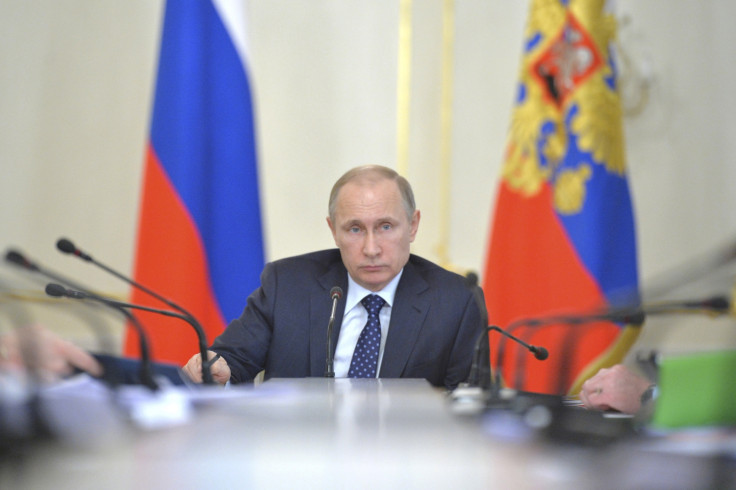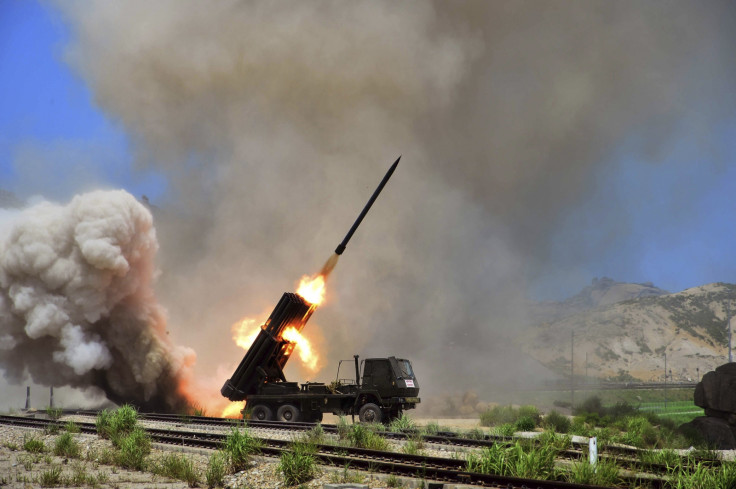Russian nuclear threat: Could Vladimir Putin really push the red button?

Notes from a recent meeting in Germany held under the auspices of the Elbe group, bringing together retired American and Russian intelligence officials, presented a stark warning from Russia over Ukraine and the Baltic States. The Russian delegation, said to have been briefed by the Kremlin, relayed the message that Russia would respond with force, including nuclear, in cases where it felt threatened.
This particularly pertained to three key areas: any attempt to return Crimea to Ukraine; the supply of weapons by Nato to Ukraine and on Nato military build-up in the Baltic States, three countries where Russia sees "the same conditions that existed in Ukraine and caused Russia to take action there".
Nato is enhancing its response force by creating a Spearhead Force with the capability of rapidly responding to security threats, and there are plans to establish six multinational command and control elements in Europe, including in Estonia, Latvia and Lithuania.
This is not the first time within the context of the Ukraine crisis that Putin has emphasised Russia's willingness to use its nuclear arsenal. In the Crimea: Path to the Motherland documentary released in March 2015, Putin said that he was ready to put Russia's nuclear weapons into a state of combat readiness during the tension over Crimea's annexation.
In the same month, a senior Russian Foreign Ministry official said that Russia has the right to place nuclear weapons in Crimea, as it planned to deploy 10 Tupolev 22M3 strategic bombers to the peninsula. Recent military exercises included plans to move nuclear-capable Iskander missiles to Kaliningrad.
Although the revised Russian military doctrine in December 2014 is not new in its allowance of tactical nuclear weapons in the case of a conventional attack that "threatens the very existence" of the Russian state, given the strengthening of Russia's narrative regarding its own perceived encirclement by Nato, such threats are potentially open to more dangerous interpretation.

An increasing challenge for the West is the difficulty in determining whether Russia is highlighting nuclear force for the purposes of scaremongering and intimidation, leverage in negotiations, or whether there is a real threat of an attack.
The increase in snap military exercises, greater presence of Russian bomber patrols around European airspace and increased naval activity, particularly around the Baltics, are deliberate. Although Russia claims these are routine, and they do not violate international rules, they are intentionally provocative given the current tension with Europe.
They simultaneously provide a way to test response times and defence capabilities, which adds to the concern around the seriousness of Russia's real intentions. The picture is further confused by the reduction in military communication channels between Nato and Europe on the one side and Russia on the other, as relations have soured.
'The increase in snap military exercises, greater presence of Russian bomber patrols around European airspace and increased naval activity, particularly around the Baltics, are deliberate. Although Russia claims these are routine, and they do not violate international rules, they are intentionally provocative given the current tension with Europe.'
The notes from the Elbe meeting are highly concerning in their emphasis on the Baltic States. The Russian delegation is said to have explained that, despite being members of Nato, the Baltic States are no different to Ukraine given that they are home to ethnic Russian populations, which could require Russian "protection".
Although each Baltic State differs in its population's proportion of ethnic Russians, this is where the Russian narrative starts to become more alarming, particularly as, up until now, Russia has broadly refrained from such direct comments directed towards the Baltics. However, it is also where the Russian narrative begins to break down and undermines the credibility of Russia's perceived security claims around Nato enlargement.
Stirring up unrest
The Baltic States are members of not only Nato, but also the EU, and therefore present a very different situation to Ukraine. They have arguably already left Russia's "sphere of influence" and local populations broadly have a lot more to lose from rejecting these institutions. Russia knows it would have to treat the Baltic States differently in terms of implementing more sophisticated hybrid warfare tactics rather than boots on the ground, and wherever there is an ethnic Russian population a pretext exists for Russia to stir up, or create, unrest.
However, it is a more tenuous argument against Nato in the Baltics, when the Baltic States are already members. This may be a sign that Russia is becoming more extreme in its threats, in part because it is running out of options to leverage its position.
Russia's threats of nuclear force show an escalation in, and at least rhetorical willingness, to extend the conflict beyond Ukraine. The Russian government and its press machine have also presented a new challenge in their alternative interpretation of facts to create a new narrative in justification of Russian policy. This makes meaningful negotiation and compromise very difficult, thus increasing the risk.
The threat of nuclear force is a useful tool in both deterrence and as a tactic to force the world to take note of Russia's position. Although the actual use of nuclear force is likely to be too extreme a measure for Russia to actually take, the break of trust between Europe and Russia, and the West's awareness of its own under-estimation of Russia's commitment to intervening in Ukraine, should mean the threat is taken seriously - but be seen within the context of Russia's negotiation position.
Sarah Lain is an analyst for the Royal United Services Institute (RUSI), a UK-based forum for those concerned with national and international defence and security. Visit www.rusi.org or follow the group on Twitter @RUSI_org to find out more.
© Copyright IBTimes 2025. All rights reserved.





















